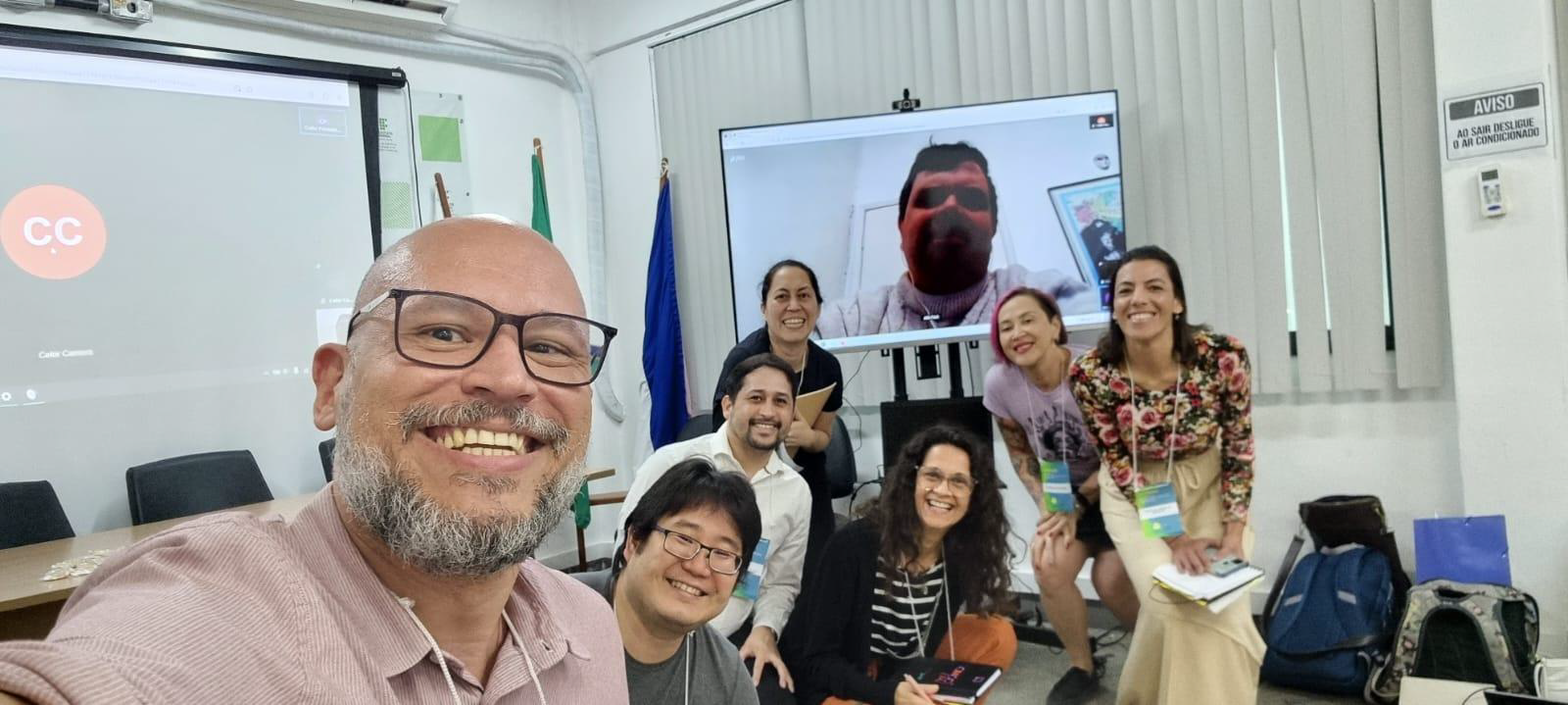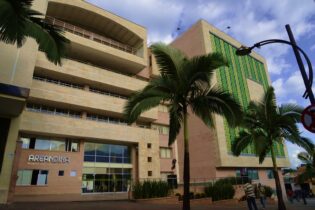EMBRACE UFABC team’s continuing teacher training experience
Published 20 January 2025

Photo by: UFABC
The EMBRACE project, funded by EACEA, focuses on modernizing higher education by enhancing teacher training in digital pedagogy, integrating CLIL and ePedagogy approaches. Through international collaboration and active learning strategies, UFABC participants developed digital competences and adapted global practices to local needs, emphasizing inclusion, accessibility, and student-centered methodologies for lasting educational transformation.
The EMBRACE project – ‘Education Modernisation Brazil, Colombia, Europe: The New Era of Digital Higher Education Cooperation’ – funded by the European Education and Culture Executive Agency (EACEA), is part of the ERASMUS-EDU-2022-CBHE call, and is structured into different work packages (WPs), all with the overall aim of promoting the training of partner institutions to adapt to the challenges of the digital age.
WP2 – teachers’ digital and pedagogical competence – aims to develop the digital and pedagogical competences of HEI teachers in innovative teaching practices and student-centred methodologies. WP2 has as its central guideline the creation of a staggered training model, which involves the use of MOOCs (large-scale open and online courses), the production of digital educational materials and the implementation of Open Badges, in accordance with the DigCompEdu Framework, including ePedagogy (Beetham & Rhoda, 2013).
Development of Teachers’ Digital and Pedagogical Competences in WP2
Teacher training activities began in August 2023, with the participation of 25 teachers from the project’s partner institutions, including 5 teachers from UFABC to act as Institutional Developers, allocated to the University’s 3 Academic Centres, in an international programme led by the Finnish institution HAMK. The UFABC lecturers involved in the training were divided into two complementary groups, the Institutional Developers (IDs), made up of Graciella Watanabe and Allan Xavier, from CCNH, Michelle Sato and Júlio Facó, from CECS, and João Sato, from CMCC; and the Experts, a group made up of Carolina Carvalho (CECS) and Carla Rodriguez (CMCC). The IDs are responsible for the pedagogical and technological structuring of the courses, ensuring that the design of the MOOCs is aligned with digital teaching practices, while the Experts brought their expertise in specific areas of pedagogical and technological skills development to the EMBRACE project.
WP2 and ID Teacher Training
WP2 implements a training model in a staggered format, in which the initial group of 25 teachers from the EMBRACE project’s partner institutions received intensive training to act as IDs. After the training, these teachers are able to promote and accompany the training of other teaching colleagues and promote improvements in institutional processes, based on the new pedagogical approaches discussed. The IDs’ teacher training followed a hybrid model, with face-to-face and online activities. In the initial phase, teachers were selected on the basis of their particular interests and some kind of previous work in the project area to take part in training in teaching methods and interactive learning resources, as well as for the implementation of student-centred teaching-learning strategies, including debate on the need for accessibility and inclusion in the most diverse socio-cultural contexts, with a view to ensuring that higher education is available regardless of their circumstances.
The Training Process: CLIL Approach and ePedagogy
In the context of WP2, the teacher training process was structured around two central approaches: CLIL (Content and Language Integrated Learning) and ePedagogy. These methodologies were chosen for their potential to integrate the development of pedagogical skills with the effective use of digital technologies, promoting a more dynamic and contextualised learning experience for teachers. The CLIL approach was central to the teacher training process, integrating the development of the pedagogical and linguistic competences of the participating teachers. This strategy sought to develop new English language skills, which favoured the project’s internationalisation process. ePedagogy, meanwhile, focused on the strategic use of digital technologies to improve teachers’ pedagogical practices. The concept of ePedagogy goes beyond the simple adoption of technologies; it is a pedagogical approach that exploits the potential of the digital environment to transform the way teaching and learning take place. This methodology ranges from the use of basic digital tools to the implementation of more advanced technologies for remote, hybrid or face-to-face teaching. A central focus of ePedagogy is the promotion of active learning methodologies, such as the inverted classroom, project-based learning and gamification, which seek to encourage students to take a more active role in their own education. The integration of CLIL and ePedagogy in WP2’s training process provided a comprehensive training experience, combining linguistic, pedagogical and technological development.
Phase One: Kick-off and Online Training
The training of the teachers participating in the project began with a three-day face-to-face event in Vitória/ES, Brazil, which took place between 30 August and 1 September 2023, hosted and organised by the Federal Institute of Espírito Santo (IFES). The event marked the start of the training’s practical activities and provided an opportunity for participants to interact and exchange ideas, fostering a spirit of collaboration and co-operation between the institutions involved, as well as starting the series of practical workshops for teachers in order to lay the foundations for the successful implementation of the project’s training process. The training continued online, with synchronous sessions and asynchronous activities on digital platforms from September 2023 to February 2024. Throughout this process, the teachers began to develop educational materials and plan the development of Massive Open Online Courses (MOOCs), which will inaugurate the second phase of WP2, in order to begin the scaling strategy.
UFABC IDs’ perspective: learnings and reflections
By taking part in international training and collaborating in the creation of online courses, the IDs experienced the challenge of integrating other technologies and pedagogical methodologies into their practices, reflecting on how these transformations can impact teaching and learning in the Brazilian context and can guide future training. One of the main learnings reported by the UFABC IDs was the expansion of their digital competences, especially the integration of digital tools with active methodologies for collaborative teaching, allowing them to explore more dynamic and interactive ways of engaging their students to take a more central role in the learning process, developing not only theoretical knowledge, but also practical skills such as collaboration, communication and critical thinking. For UFABC’s IDs, this change in pedagogical focus represented an opportunity to rethink the traditional teaching model and experiment with other practices that promote more active, student-centred learning.
UFABC IDs’ perspective: challenges and lessons learnt
The experience with WP2 also generated important reflections on the challenges and opportunities of implementing these strategies in the UFABC context. One of the points of reflection was the need to adapt new tools and methodologies to the specificities of the institution and its target audience. Although digital technologies and active pedagogies have great potential to improve teaching, the DIs recognised that their successful application depends on a thorough understanding of local realities, such as the socio-economic profile of the students and the technological infrastructure and accessibility conditions available. In addition, the DIs have realised that the development of digital and pedagogical skills cannot be treated as a one-off event, but rather as a continuous process of learning and adaptation. For these innovations to have a lasting impact, it will be necessary to create a culture of ongoing training in which teachers can exchange experiences, share good practices and continue to develop their skills in response to technological and pedagogical changes. Another important aspect identified was the role of international collaboration in the training process. Exchanging experiences with international partners has allowed UFABC IDs to broaden their vision of the different ways of ways of integrating technology and pedagogy in educational environments. However, it also became clear that each institution has its own particularities, and that directly importing foreign models is not always feasible. Instead, international collaboration was seen as an opportunity to adapt good practices to local realities, while respecting the cultural and institutional specificities of each partner university.
Based on these learnings and reflections, the UFABC team proposed a series of improvements that could not only enhance future WP2 trainings, but also influence the development of educational programmes in a wider context. By focusing on methodology, time organisation, overcoming language challenges and accessibility, it is hoped that future trainings will be even more effective, inclusive and sustainable. WP2 represents an important transformation for teacher training, integrating pedagogical and digital innovations. The IDs’ perceptions provide valuable aspects for future training, highlighting the importance of adapting course time, dealing with language and cultural barriers, and prioritising active and student-centred methodologies.
References:
- Beetham, Helen, & Sharpe, Rhona (Eds.) (2013). Rethinking Pedagogy for a Digital Age: Designing for 21st Century Learning (2nd ed.). Routledge. Anderson, Terry (2008). The Theory and Practice of Online Learning (2nd ed.). Athabasca University Press.



